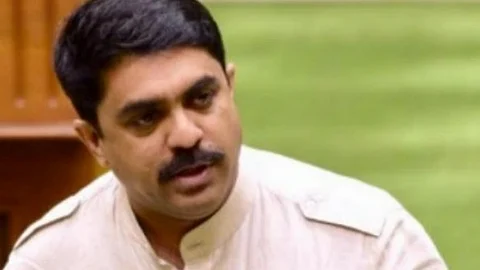

Goa Forward Party (GFP) President and Fatorda MLA Vijai Sardesai has raised alarm that Goa is on the verge of being branded the liquor smuggling capital of India. In a strongly worded letter to the state’s Finance Secretary, Sardesai described the situation as a betrayal of public trust and a crime that robs lives, revenue, and Goa’s reputation. He warned that what was once petty bootlegging has now evolved into a corporate-style criminal economy worth thousands of crores, fuelled by Goa’s low-tax liquor regime and enabled by enforcement failures.
Sardesai highlighted that smuggling networks have transformed Goa into a national hub for the illegal liquor trade, with well-established routes through Polem beach, the Cotigao forest, the Konkan Railway tunnel, and the NH-66 highway, where trucks routinely evade checks. He noted that if even ten trucks carrying consignments worth ₹2 crore each cross the border daily, the annual value of liquor smuggling exceeds ₹730 crore—money neither taxed by the Union nor earned by Goa. “This is no longer petty smuggling, it is an organised criminal industry with Goa as its beating heart,” Sardesai wrote.
Citing a string of seizures across the country, Sardesai pointed to the sheer scale of the trade and its deep links to Goa’s distilleries. Among the cases he flagged were seizures in Pune of liquor worth ₹1.33 crore packed with fake labels, consignments worth over ₹3 crore traced to Goa bottling units in Navsari, Gujarat, and an illicit container shipment worth ₹1.27 crore seized in Bharuch that investigators linked to the Bishnoi gang operating in Goa’s liquor trade. In Thane, police intercepted 800 boxes of Goa IMFL valued at ₹64 lakh, while in Pimpri-Chinchwad, a consignment worth nearly ₹25 lakh was seized. He further pointed out that entire distilleries have been implicated, citing Galestrom Distillery in Pissurlem, which was sealed after being linked to Gujarat supplies.
According to Sardesai, the business is now dominated by organized criminal syndicates, including gangs from Rajasthan that orchestrate container shipments across multiple states. The profitability of Goa liquor, which offers 400 percent margins compared to around 20 percent elsewhere, has made it the lifeblood of interstate bootlegging networks, he alleged.
Beyond economic loss, Sardesai warned of a public health emergency arising from adulterated liquor traced to Goa. He said counterfeit alcohol contained toxic chemicals such as methanol, acetone, and industrial solvents, which could cause blindness and death. Fake vodka and whisky brands produced with low-grade ingredients were being pushed into markets outside the state, he added, making Goa the origin point of toxic alcohol poisoning cases nationwide.
Sardesai also drew attention to repeated enforcement failures and alleged collusion. He cited incidents such as a Nagaland-registered truck carrying illicit liquor that caught fire at Dhargal after passing through multiple checkpoints without permits, and the arrest of a Goa Excise Inspector in Karnataka for smuggling liquor himself. “The smuggling thrives because enforcement has collapsed under negligence and complicity,” Sardesai stated, accusing the Excise Department of shielding masterminds while targeting only small smugglers and drivers.
He criticised government measures such as the recent plan to introduce holograms on bottles, calling it a recycled idea first proposed in 2012 that does little to stop smuggling through unmonitored routes. “No hologram can stop smuggling through trucks, tunnels, or boats. What is required is a statewide crackdown,” he asserted.
The Fatorda MLA said that while the government claimed excise revenues had risen 45 percent in four years to touch ₹947.9 crore in 2024–25, this was due to higher duties burdening tourists and locals, not because of effective enforcement. He described the unchecked smuggling as a fiscal fraud against Goans.
Sardesai demanded urgent action, including the formation of a multi-agency task force under the Chief Secretary, surprise audits of distilleries, strengthened border and coastal security, and the prosecution of corrupt excise officers. He also pressed for the use of technology such as GPS tracking of consignments and AI-enabled scanning at checkpoints, along with quarterly public reports on seizures and prosecutions to ensure transparency.
“The people of Goa demand clarity: Is the government serious about tackling this menace, or will it continue issuing hollow statements while smugglers grow stronger?” Sardesai asked, warning that failure to act would confirm suspicions that the illicit liquor trade enjoys protection at the highest levels. He called for a detailed action plan within a month, stressing that inaction would only cement Goa’s reputation as the country’s liquor smuggling hub.